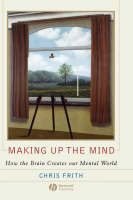
Making up the Mind
Wiley-Blackwell (Verlag)
978-1-4051-3694-5 (ISBN)
- Titel z.Zt. nicht lieferbar
- Versandkostenfrei
- Auch auf Rechnung
- Artikel merken
Written by one of the world’s leading neuroscientists, Making Up the Mind is the first accessible account of experimental studies showing how the brain creates our mental world.
Uses evidence from brain imaging, psychological experiments and studies of patients to explore the relationship between the mind and the brain
Demonstrates that our knowledge of both the mental and physical comes to us through models created by our brain
Shows how the brain makes communication of ideas from one mind to another possible
Chris Frith is Professor in Neuropsychology at the Wellcome Trust Centre for Neuroimaging at University College London. His publications include Schizophrenia: A Very Short Introduction (2003, with Eve C. Johnstone) and The Neuroscience of Social Interaction (2004, edited with Daniel Wolpert).
List of Abbreviations ix
Preface x
Acknowledgments xi
Prologue: Real Scientists Don’t Study the Mind 1
The Psychologist’s Fear of the Party 1
Hard Science and Soft Science 3
Hard Science – Objective; Soft Science – Subjective 5
Can Big Science Save Soft Science? 7
Measuring Mental Activity 9
How Can the Mental Emerge from the Physical? 15
I Can Read Your Mind 16
How the Brain Creates the World 16
Part I Seeing through the Brain’s Illusions 19
1 Clues from a Damaged Brain 21
Sensing the Physical World 21
The Mind and the Brain 22
When the Brain Doesn’t Know 24
When the Brain Knows, But Doesn’t Tell 27
When the Brain Tells Lies 29
How Brain Activity Creates False Knowledge 31
How to Make Your Brain Lie to You 34
Checking the Reality of Our Experiences 36
How Do We Know What’s Real? 37
2 What a Normal Brain Tells Us about the World 40
Illusions of Awareness 40
Our Secretive Brain 44
Our Distorting Brain 48
Our Creative Brain 50
3 What the Brain Tells Us about Our Bodies 61
Privileged Access? 61
Where’s the Border? 61
We Don’t Know What We Are Doing 64
Who’s in Control? 66
My Brain Can Act Perfectly Well without Me 68
Phantoms in the Brain 70
There’s Nothing Wrong with Me 74
Who’s Doing It? 75
Where Is the “You”? 77
Part II How the Brain Does It 83
4 Getting Ahead by Prediction 85
Patterns of Reward and Punishment 85
How the Brain Embeds Us in the World and Then Hides Us 100
The Feeling of Being in Control 105
When the System Fails 107
The Invisible Actor at the Center of the World 109
5 Our Perception of the World Is a Fantasy That Coincides with Reality 111
Our Brain Creates an Effortless Perception of the Physical World 111
The Information Revolution 112
What Can Clever Machines Really Do? 116
A Problem with Information Theory 117
The Reverend Thomas Bayes 119
The Ideal Bayesian Observer 123
How a Bayesian Brain Can Make Models of the World 125
Is There a Rhinoceros in the Room? 125
Where Does Prior Knowledge Come From? 127
How Action Tells Us about the World 130
My Perception Is Not of the World, But of My Brain’s Model of the World 132
Color Is in the Brain, Not in the World 134
Perception Is a Fantasy That Coincides with Reality 134
We Are Not the Slaves of Our Senses 135
So How Do We Know What’s Real? 136
Imagination Is Extremely Boring 137
6 How Brains Model Minds 139
Biological Motion: The Way Living Things Move 140
How Movements Can Reveal Intentions 141
Imitation 144
Imitation: Perceiving the Goals of Others 145
Humans and Robots 148
Empathy 149
The Experience of Agency 151
The Problem with Privileged Access 155
Illusions of Agency 156
Hallucinating Other Agents 157
Part III Culture and the Brain 161
7 Sharing Minds – How the Brain Creates Culture 163
The Problem with Translation 163
Meanings and Goals 165
Solving the Inverse Problem 166
Prior Knowledge and Prejudice 167
What Will He Do Next? 168
Other People Are Contagious 169
Communication Is More Than Just Speaking 170
Teaching Is Not Just a Demonstration To Be Imitated 171
Closing the Loop 173
Fork Handles: The Two Ronnies Close the Loop (Eventually) 174
Fully Closing the Loop 175
Knowledge Can Be Shared 175
Knowledge Is Power 177
The Truth 179
Epilogue: Me and My Brain 184
Chris Frith and I 184
Searching for the Will in the Brain 185
Where Is the Top in Top-Down Control? 186
The Homunculus 188
This Book Is Not About Consciousness 189
Why Are People So Nice (as Long as They Are Treated Fairly)? 190
Even an Illusion Has Responsibilities 191
The Evidence 194
Illustrations and Text Credits 218
Index 226
| Erscheint lt. Verlag | 3.5.2007 |
|---|---|
| Verlagsort | Hoboken |
| Sprache | englisch |
| Maße | 150 x 250 mm |
| Gewicht | 482 g |
| Themenwelt | Geisteswissenschaften ► Psychologie |
| ISBN-10 | 1-4051-3694-4 / 1405136944 |
| ISBN-13 | 978-1-4051-3694-5 / 9781405136945 |
| Zustand | Neuware |
| Informationen gemäß Produktsicherheitsverordnung (GPSR) | |
| Haben Sie eine Frage zum Produkt? |
aus dem Bereich


